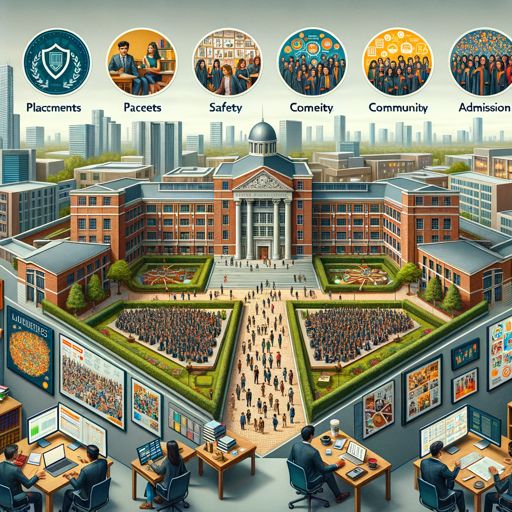Innovative Institute of Law Overview
Innovative Institute of Law in Greater Noida, Uttar Pradesh operates as a purpose-built center for legal education catering to Delhi NCR. Located within an education hub close to NH‑24 and the Noida‑Greater Noida Expressway, the campus blends academic infrastructure with access to courts, corporate offices, and NGOs in the national capital region. The campus places emphasis on academic rigor, practical training, and community engagement.
Campus Overview and Location
The campus sits in the Knowledge Park area of Greater Noida, about 40 km from central Delhi and roughly 12 km from Noida Sector 62 metro corridor. Daily connectivity includes expressway buses, shared cabs, and rapid access via the Yamuna Expressway for students commuting from South Delhi and Ghaziabad. The physical layout groups academic blocks, moot court complex, library, and hostels within a compact footprint to minimize transit time between classes and practical facilities.
Green areas include a central quad, botanical walkways, and a small amphitheater used for open air lectures and cultural evenings. Landscaping uses native trees such as neem and peepal to provide shade and reduce urban heat. Key buildings are the academic block with smart lecture halls, a separate moot court complex built to Delhi High Court specifications, and a dedicated building for legal clinics and pro bono work.
Academic Environment
Programs include integrated five‑year B.A. LL.B. and three‑year LL.B. degrees approved by the Bar Council of India and affiliated with a statutory university in Uttar Pradesh. Course structure emphasizes core law subjects in the first years and offers electives in arbitration, intellectual property, corporate law, and human rights in later terms. Assessment follows a mix of term exams, practical evaluations, moot performance, and internship reports.
Classrooms are equipped with projector systems, portable recording, and interactive whiteboards to support blended teaching. Faculty comprises academics with doctoral credentials, government experienced practitioners, and visiting partners from city firms. Student interaction is structured through small tutorial groups, mandatory faculty mentoring meetings each semester, and research supervision for final year projects. The legal clinic complex hosts regular litigation clinics, consumer rights clinics, and counseling cells that operate under faculty supervision.
Practical Training and Skill Development
Practical training is central, with a full moot courtroom wing, mock trial rooms, and mediation suites. Clinical work integrates with local courts including the Gautam Buddh Nagar District Court and regular placements for interns at chambers in the Supreme Court and Delhi High Court. Workshops invite senior advocates, sitting judges, and corporate counsels to conduct skill sessions on drafting, negotiation, and witness examination.
Before the next explanatory table, clinics and practical placements are coordinated through a central office that logs opportunities and certifies hours for each student. The following structured overview shows representative partners, roles typically offered, and common stipend ranges as seen in the Delhi NCR legal training market.
| Partner / Venue | Typical Roles Offered | Duration Range | Common Stipend (INR/month) |
|---|---|---|---|
| District Courts, Gautam Buddh Nagar | Court internships, litigation support | 1–6 weeks | 0–5,000 |
| Supreme Court Chambers, New Delhi | Research assistant, drafting | 2–12 weeks | 5,000–25,000 |
| Shardul Amarchand Mangaldas; Khaitan & Co; Trilegal | Corporate law internships | 4–12 weeks | 10,000–40,000 |
| Delhi High Court Advocates | Moot mentoring, case research | 2–8 weeks | 0–15,000 |
| Human Rights Law Network; DLSA | Public interest internships, fieldwork | 4–12 weeks | 0–10,000 |
| Corporate legal departments (Amazon, TCS) | Compliance, contract review | 8–12 weeks | 10,000–35,000 |
After practical placements, students present reflection reports and receive credit toward practical training requirements. Regular mock trials are judged by external senior counsels to simulate courtroom pressure.
Library and Learning Resources
The central library houses printed statutes, law reports, journals, and a growing digital collection. Subscriptions include major Indian law reporters and international databases accessible on campus terminals and via secure remote login. Research support includes dedicated reference librarians, citation workshops, and reserved study carrels for group projects. Separate quiet reading rooms are available for moot preparation and dissertation work.
Student Life and Culture

Student life balances academics with active societies and cultural events. Clubs include the Moot Society, Human Rights Forum, Corporate Law Cell, and Photography Club. Annual cultural festivals attract performers from Delhi NCR and include legal quizzes and talent nights that showcase music, dance, and theater. Literary activities are anchored by debating competitions that follow British Parliamentary format and host teams for intercollegiate meets.
- Membership in clubs requires participation in at least two activities each semester to encourage breadth of experience.
- Major events include a legal conclave held in October and a cultural festival in February that coincide with corporate recruitment cycles.
Hostel and Residential Facilities
On‑campus residential blocks provide separate accommodation for men and women with biometric entry and round the clock security. Rooms are single and shared occupancy with free campus Wi Fi and laundry services. Dining options include vegetarian and mixed menus in the central dining hall plus a student run cafeteria that sources local meals. Maintenance teams conduct weekly inspections and medical staff are on call for emergencies.
- Visitor policies and mess timings are posted at the reception and enforced to ensure safety.
Placements, Safety, Community and Admissions

The career development cell maintains ties with law firms, corporate legal teams, NGOs, and government legal offices across Delhi NCR and organizes placement drives each spring. Alumni engagement brings mentorship and recruitment support. Safety measures include CCTV coverage, campus patrols, and emergency response coordination with local police. Inclusivity policies cover support for students with disabilities and grievance redressal mechanisms conforming to statutory norms and mandatory anti‑ragging directives.
Community outreach includes legal literacy camps in nearby villages and collaboration with the District Legal Services Authority for free clinics. Sustainability initiatives focus on waste segregation, rainwater harvesting, and a phased transition to LED campus lighting.
Admissions follow entrance test criteria common to law programs in Uttar Pradesh with published eligibility and transparent fee schedules. Scholarships for meritorious and economically disadvantaged students are administered each year by a committee with documented criteria. Orientation programs run for two weeks and combine academic briefings with practical training modules.
Continued engagement with alumni supports lifelong professional development through seminars, networking events, and periodic continuing legal education sessions that reflect evolving practice needs in Delhi NCR. The campus environment aims to shape graduates who are practically skilled, ethically grounded, and prepared for varied legal careers.


